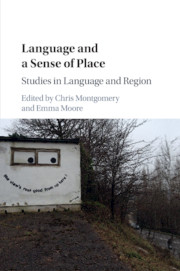Book contents
- Language and a Sense of Place
- Language and a Sense of Place
- Copyright page
- Contents
- Figures
- Tables
- Contributors
- Preface and Acknowledgements
- Introduction
- Part I Changing Places
- Part II Describing Places
- Part III Identifying Places
- Part IV Enregistering Places
- 13 Characterological Figures and Expressive Style in the Enregisterment of Linguistic Variety
- 14 Enregisterment, Indexicality and the Social Meaning of Howay
- 15 Indexing Acadian Identities
- 16 ‘Turtlely Amazing’
- Index
- References
13 - Characterological Figures and Expressive Style in the Enregisterment of Linguistic Variety
from Part IV - Enregistering Places
Published online by Cambridge University Press: 13 July 2017
- Language and a Sense of Place
- Language and a Sense of Place
- Copyright page
- Contents
- Figures
- Tables
- Contributors
- Preface and Acknowledgements
- Introduction
- Part I Changing Places
- Part II Describing Places
- Part III Identifying Places
- Part IV Enregistering Places
- 13 Characterological Figures and Expressive Style in the Enregisterment of Linguistic Variety
- 14 Enregisterment, Indexicality and the Social Meaning of Howay
- 15 Indexing Acadian Identities
- 16 ‘Turtlely Amazing’
- Index
- References
- Type
- Chapter
- Information
- Language and a Sense of PlaceStudies in Language and Region, pp. 283 - 300Publisher: Cambridge University PressPrint publication year: 2017
References
- 27
- Cited by

